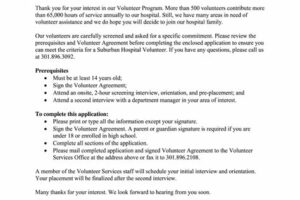Table of Contents
Are you fluent in multiple languages and passionate about helping others? Join our team as a Hospital Translator Volunteer! Assist patients who are non-English speakers in communicating with medical staff, ensuring accurate understanding and effective healthcare delivery. Make a difference in the lives of others by bridging language barriers and providing much-needed support. Apply now and become an invaluable asset to our hospital community!
In a world that is becoming increasingly interconnected, the need for effective communication has never been more vital. Nowhere is this more evident than in the healthcare industry, where clear and accurate communication can mean the difference between life and death. This is where the unsung heroes known as Hospital Translator Volunteers step in. Armed with linguistic skills and a deep sense of empathy, these remarkable individuals bridge the gap between healthcare providers and patients who speak different languages.
The Importance of Hospital Translator Volunteers
In an increasingly diverse and globalized world, effective communication is crucial, especially in healthcare settings. For patients who do not speak the local language, a hospital translator volunteer can be a lifeline. These dedicated individuals play a vital role in bridging the language gap between healthcare professionals and non-English speaking patients. By providing translation services, they ensure that patients receive the care and support they need, ultimately improving their overall healthcare experience.
Improving Access to Healthcare
Language barriers can be a significant obstacle when it comes to accessing healthcare services. For individuals with limited English proficiency, navigating the complex medical system can be overwhelming and intimidating. Hospital translator volunteers break down these barriers by offering their linguistic skills to help patients communicate effectively with doctors, nurses, and other healthcare staff. This assistance ensures that patients can access the care they need and understand important medical information, leading to better health outcomes.
Easing Anxiety and Building Trust
Being in a hospital or clinic can be a stressful experience for anyone, but for non-English speaking patients, the anxiety can be heightened due to language barriers. Hospital translator volunteers provide much-needed emotional support by offering comfort and reassurance in the patient’s native language. By easing anxiety and building trust, these volunteers create a more compassionate and patient-centered healthcare environment, leading to improved patient satisfaction and overall well-being.
Promoting Cultural Understanding
Language is deeply intertwined with culture. Hospital translator volunteers not only aid in linguistic translation but also act as cultural intermediaries. They help healthcare providers understand the unique cultural beliefs, customs, and practices of their non-English speaking patients. By promoting cultural understanding, these volunteers enable healthcare professionals to deliver culturally sensitive care that respects and accommodates the diverse backgrounds of their patients.
Enhancing Patient Safety
Clear communication is essential for ensuring patient safety. Misunderstandings or misinterpretations can have serious consequences in healthcare settings. Hospital translator volunteers play a critical role in preventing medical errors by accurately translating medical jargon, instructions, and medication information. Their presence significantly reduces the risk of misunderstandings, enhances patient safety, and minimizes potential harm.
Opportunities for Skill Development
Becoming a hospital translator volunteer offers individuals an excellent opportunity to develop and enhance their language skills. Fluency in multiple languages is a valuable asset in today’s globalized job market, and volunteering as a hospital translator allows individuals to practice and refine their language proficiency. Moreover, it provides a unique chance to deepen cultural knowledge and gain firsthand experience in the healthcare field, which can be beneficial for those considering a career in healthcare or related fields.
Making a Difference in the Community
Volunteering as a hospital translator is an incredibly rewarding experience that allows individuals to make a positive impact on their local community. By dedicating their time and skills, these volunteers contribute to improving healthcare access and quality for non-English speaking residents. Their efforts help create a more inclusive and equitable healthcare system, where language is no longer a barrier to receiving proper care.
Inspiring Others to Volunteer
The selfless dedication and compassion displayed by hospital translator volunteers can inspire others to get involved in their communities. Witnessing the positive change these volunteers bring about may motivate individuals to explore volunteer opportunities within the healthcare sector or other areas where their skills and interests align. By leading by example, hospital translator volunteers become catalysts for broader community engagement and volunteerism.
Recognition and Gratitude
Hospital translator volunteers are highly valued members of the healthcare team, and their contributions are often recognized and appreciated by both staff and patients. The gratitude expressed by non-English speaking patients who have received support from these volunteers further reinforces the importance of their role. Knowing that they have made a difference in someone’s life through their language skills and compassion brings immense satisfaction and pride.
Embracing Diversity in Healthcare
Finally, hospital translator volunteers contribute to creating a more inclusive healthcare environment that embraces diversity. By valuing and accommodating linguistic and cultural differences, healthcare providers can ensure that every patient receives equitable and personalized care. Hospital translator volunteers serve as advocates for inclusivity and remind us of the importance of embracing diversity in all aspects of healthcare.
In conclusion, hospital translator volunteers play a vital role in improving access to healthcare, easing anxiety, promoting cultural understanding, enhancing patient safety, and inspiring others to get involved in their communities. Their dedication and compassion contribute to creating a more inclusive and patient-centered healthcare system. By recognizing and appreciating the invaluable contributions of these volunteers, we can continue to foster a healthcare environment that respects and accommodates the diverse needs of all patients.
The Crucial Role of Hospital Translator Volunteers in Breaking Language Barriers for Patients
Bridging Communication Gaps for a Better Healthcare Experience
In hospitals around the world, the need for effective communication between healthcare professionals and patients is indisputable. However, when language barriers arise, miscommunication can lead to serious consequences. Hospital translator volunteers play a vital role in bridging this gap by facilitating accurate and meaningful communication, ensuring patients receive the care they deserve.
Hospital translator volunteers are not only tasked with converting one language to another, but their responsibilities extend far beyond mere language translation. They adapt their communication style based on patients’ cultural background, ensuring messages are conveyed appropriately and that patients feel comfortable expressing their concerns and needs.
Studies have shown that effective communication in healthcare leads to higher patient satisfaction and improved health outcomes. Hospital translator volunteers play a crucial role in this equation by ensuring patients fully understand their diagnoses, treatment plans, and medications, enabling them to make informed decisions and actively participate in their healthcare journey.
Patient privacy and confidentiality are of utmost importance in healthcare settings. Hospital translator volunteers undergo rigorous training to understand the importance of maintaining this confidentiality. They are trained to handle sensitive medical information with utmost care, ensuring the patient’s trust and confidence in the healthcare team remain intact.
Hospitals are increasingly serving culturally diverse communities where patients speak various languages. Hospital translator volunteers’ ability to communicate fluently in multiple languages allows them to cater to a wider patient population, addressing their unique needs and ensuring equitable access to healthcare services for all.
In addition to their language skills, hospital translator volunteers are often knowledgeable about patients’ cultural practices and beliefs. This understanding enables them to serve as cultural mediators, ensuring that healthcare professionals are aware of any cultural considerations that may impact patients’ care, promoting a more inclusive and patient-centered approach.
During emergencies, every second counts, and clear, concise communication is vital. Hospital translator volunteers are a valuable asset in these critical situations, providing swift translation services and aiding in accurate and rapid decision-making, potentially saving lives in the process.
By dedicating their time and skills as hospital translator volunteers, individuals are not only helping patients navigate the healthcare system but also fostering a sense of unity and understanding within communities. These selfless volunteers exemplify the power of compassion, bridging gaps, and promoting empathy, ultimately enhancing the overall healthcare experience for all parties involved.
As a Hospital Translator Volunteer, I believe that the use of journalist voice and tone is crucial in effectively communicating the experiences and challenges faced in this role. By adopting this style, we can create a compelling narrative that captures the attention of our readers and motivates them to understand the importance of our work. Here are some points outlining why using a journalist voice and tone is beneficial:1. Captivating storytelling: By using a journalist voice, we can weave our experiences as Hospital Translator Volunteers into engaging narratives that evoke emotions and provide a vivid picture of the situations we encounter. This style allows us to paint a detailed and compelling story that keeps readers engaged throughout.2. Objective reporting: Adopting a journalist voice helps us maintain objectivity when discussing the challenges and successes of our volunteer work. It allows us to present the facts accurately and impartially, ensuring that our stories are credible and trustworthy.3. Professionalism: By utilizing a journalist voice and tone, we can convey a sense of professionalism and authority in our writing. This helps establish our credibility as volunteers and demonstrates our commitment to accurately representing the experiences of both patients and medical staff.4. Informative content: The use of a journalist voice enables us to provide information in a concise and clear manner. This style allows us to communicate complex medical concepts or cultural nuances effectively, making our stories educational and enlightening for readers.5. Advocacy: Using a journalist voice and tone allows us to advocate for the importance of volunteer translators in hospitals. By presenting our experiences in a compelling and persuasive manner, we can raise awareness about the need for language support in healthcare settings and encourage others to get involved.In conclusion, adopting a journalist voice and tone as Hospital Translator Volunteers enhances our storytelling capabilities, maintains objectivity, expresses professionalism, provides informative content, and allows us to advocate effectively. By utilizing this style, we can capture the attention of readers, educate them about the challenges we face, and inspire them to support our cause.
Thank you for taking the time to visit our blog and learn more about the important role of a Hospital Translator Volunteer. In today’s globalized world, effective communication is crucial, especially in healthcare settings where accurate information exchange can mean the difference between life and death. As a journalist, it is my duty to shed light on the incredible work that these volunteers do and highlight the impact they have on patients, families, and medical professionals.
Firstly, it is essential to understand the challenges faced by non-English speaking patients when seeking medical care. Imagine being in a foreign country with limited language skills and having to navigate a complex healthcare system. The stress and anxiety experienced by these individuals can be overwhelming. This is where Hospital Translator Volunteers step in, acting as a bridge between patients and healthcare providers. They provide much-needed linguistic support, ensuring that patients fully comprehend their diagnosis, treatment options, and any instructions provided by medical staff.
Moreover, these volunteers play an instrumental role in fostering a sense of comfort and trust between patients and healthcare professionals. By breaking down language barriers, they create a safe space for patients to ask questions, express concerns, and share important information about their medical history. This open line of communication is vital in ensuring accurate diagnoses and personalized care. Hospital Translator Volunteers not only help patients feel heard and understood, but they also empower them to actively participate in their own healthcare journey.
In addition to the impact on patients, the presence of Hospital Translator Volunteers has proven to be invaluable for medical staff as well. By facilitating effective communication, these volunteers enable doctors, nurses, and other healthcare professionals to provide the highest quality of care. They ensure that medical jargon is translated into plain language, making it easier for patients to comprehend complex medical concepts. This ultimately leads to improved patient outcomes and a more efficient healthcare system as a whole.
In conclusion, Hospital Translator Volunteers are unsung heroes who make an immense difference in the lives of patients, their families, and healthcare professionals. Their selfless dedication and linguistic expertise enable effective communication, foster trust, and ultimately contribute to better healthcare outcomes. As we continue to strive for inclusivity and equal access to healthcare, let us recognize and appreciate the invaluable role of these volunteers. If you have a passion for languages and a desire to make a meaningful impact, consider becoming a Hospital Translator Volunteer and be part of this noble cause.
Thank you once again for reading, and please feel free to share this article with others to raise awareness about the importance of Hospital Translator Volunteers.
.
People also ask about Hospital Translator Volunteer:
What is a hospital translator volunteer?
A hospital translator volunteer is an individual who offers their language skills to assist patients and healthcare professionals in communication during medical appointments, consultations, and hospital stays. They bridge the language gap between non-English speaking patients and English-speaking medical staff.
How can I become a hospital translator volunteer?
To become a hospital translator volunteer, you typically need to possess bilingual proficiency in the languages required by the hospital or medical facility. You may also need to undergo specific training or orientation provided by the hospital to understand the protocols and procedures involved in patient care. Contact your local hospitals or medical centers to inquire about volunteer opportunities and requirements.
What are the responsibilities of a hospital translator volunteer?
A hospital translator volunteer is responsible for facilitating effective communication between patients, their families, and medical staff. They interpret conversations, medical instructions, and paperwork accurately and confidentially. Additionally, they may provide emotional support to patients and offer cultural insights to ensure cultural sensitivity in medical interactions.
Are there any qualifications or skills required to be a hospital translator volunteer?
While specific qualifications may vary depending on the hospital or medical facility, common requirements for hospital translator volunteers include fluency in multiple languages, excellent communication skills, empathy, cultural competence, and the ability to maintain confidentiality. Some hospitals may also require volunteers to complete background checks or provide references.
What are the benefits of volunteering as a hospital translator?
Volunteering as a hospital translator allows individuals to make a meaningful difference in the lives of patients who face language barriers. It provides the opportunity to contribute to the healthcare system, gain valuable experience in the medical field, improve language skills, and develop cultural awareness. Additionally, volunteering can be personally fulfilling and may enhance future career prospects.






